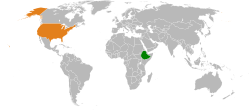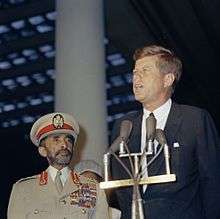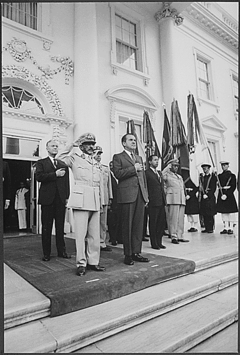Ethiopia–United States relations
 |
|
Ethiopia |
United States |
|---|---|
Ethiopia–United States relations are bilateral relations between Ethiopia and the United States. Ethiopia is a strategic partner of the United States in the Global War on Terrorism. The United States is the largest donor to Ethiopia: in 2008 U.S. foreign aid to Ethiopia totaled US$969 million, in 2009 US$916, with 2010 estimated at US$513 and US$586 requested for 2011.[1] U.S. development assistance to Ethiopia is focused on reducing famine vulnerability, hunger, and poverty and emphasizes economic, governance, and social sector policy reforms. Some military training funds, including training in such issues as the laws of war and observance of human rights, also are provided.
Recently, the Ethiopian government has been criticized for severe human rights violations. According to Human Rights Watch, the aid given by the United States is being abused to erode democracy in Ethiopia.[2]
The current Ambassador of Ethiopia to the United States is Girma Birru; he is also accredited to Canada and Mexico. Principal U.S. Officials include Ambassador Donald Y. Yamamoto and Deputy Chief of Mission Deborah Malac. The U.S. Embassy in Ethiopia is located in Addis Ababa.
According to the 2012 U.S. Global Leadership Report, 54% of Ethiopians approve of U.S. leadership, with 8% disapproving and 38% uncertain.[3]
Twentieth century relations
U.S.-Ethiopian relations were established in 1903, after nine days of meetings in Ethiopia between Emperor Menelik II and Robert P. Skinner, an emissary of President Theodore Roosevelt. This first step was augmented with treaties of arbitration and conciliation signed at Addis Ababa 26 January 1929.[4] These formal relations included a grant of Most Favored Nation status, and were good up to the Italian occupation in 1935.
Warqenah Eshate, while visiting the United States in 1927, visited Harlem, where he delivered Ras Tafari's greetings to the African-American community and Tafari's invitation to skilled African Americans to settle in Ethiopia. A number of African-Americans did travel to Ethiopia, where they played a number of roles in the modernization of the country before the Italian conquest in 1935.[5]
In his autobiography, Emperor Haile Selassie notes that the United States was one of only five countries which refused to recognize the Italian conquest of his country.[6]

Following the return of Emperor Haile Selassie to Ethiopia, the United States certified Ethiopia for participation in Lend-Lease. This was followed on 16 May 1944 by the arrival of what was later called the Fellows Mission, led by James M. Landis.[7] Another significant event transpired in January 1944, when President Franklin Roosevelt met personally with Emperor Haile Selassie aboard the USS Quincy (CA-71) in the Great Bitter Lake of Egypt. Although no matters of substance were resolved, the meeting both strengthened the Emperor's already strong predilection towards the United States, as well as discomforted the British who had been at odds with the Ethiopian government over the disposition of Eritrea and the Ogaden.[8] These ties were strengthened with the signing of the September 1951 treaty of amity and economic relations.[9] In 1953, a further two agreements were signed: a mutual defense assistance agreement, under which the United States agreed to furnish military equipment and training, and an accord regularizing the operations of a U.S. communication facility at Asmara, Kagnew Station. In 1957, then U.S. Vice President Richard Nixon visited Ethiopia and called it "one of the United States' most stalwart and consistent allies".[10] In addition, during the 1960s the U.S. Army provided mapping for much of the country of Ethiopia in an operation known as the Ethiopia-United States Mapping Mission.[11] Through fiscal year 1978, the United States provided Ethiopia with $282 million in military assistance and $366 million in economic assistance in agriculture, education, public health, and transportation.

Ethiopia was one of the first countries to take part in the American Peace Corps program, which emphasized agriculture, basic education, tourism, health, economic development and teaching English as a foreign language. The Peace Corps reports that since 1962, when its first volunteers arrived in Ethiopia, a total of 2,934 volunteers have served in that country.[12] U.S. Information Service educational and cultural exchanges were also an important part of their relations.
Mengistu Regime
After the Ethiopian Revolution, the bilateral relationship began to cool due to the Derg's linking with international communism and U.S. revulsion at the junta's human rights abuses. The United States rebuffed Ethiopia's request for increased military assistance to intensify its fight against the Eritrean secessionist movement and to repel the Somali invasion. The International Security and Development Act of 1985 prohibited all U.S. economic assistance to Ethiopia with the exception of humanitarian disaster and emergency relief. In July 1980, the U.S. Ambassador to Ethiopia was recalled at the request of the Ethiopian Government (who was then Frederic L. Chapin), and the U.S. Embassy in Ethiopia and the Ethiopian Embassy in the United States were headed subsequently by Charges d'Affaires.[13]
Post-Mengistu regime
With the downfall of Mengistu Haile Mariam (who had taken control of the Derg), U.S.-Ethiopian relations improved as legislative restrictions on non-humanitarian assistance to Ethiopia were lifted. Diplomatic relations were upgraded to the ambassadorial level in 1992. Total U.S. government assistance, including food aid, between 1991 and 2003 was $2.3 billion. During the severe drought year of 2003, the U.S. provided a record $553.1 million in assistance, of which $471.7 million was food aid.[13]
Twenty-first century relations
U.S. Congress legislation
The U.S. Congress, however, has set conditions, over the objections of the Bush Administration. In October, the House of Representatives passed the EDAA, banning military aid, for other than counter-terror and peacekeeping unless Ethiopia improves its human rights record. The bill seeks to restrict U.S. military aid for any purpose other than counter-terrorism and peacekeeping purposes. If the President certifies that all political prisoners have been released and an independent media can function without excessive interference, full, normal military aid can resume. The US will provide around $300 million of aid to Ethiopia this year but it is unclear how much would be affected by the bill, which also exempts humanitarian, health care and emergency food assistance. It would restrict security assistance and impose travel restrictions on Ethiopian officials accused of human rights violations unless Ethiopia met the conditions – although the legislation would give the president a waiver to prevent such measures from taking force. The bill still has to pass the Senate before being presented to the Administration.
The Act also exempts counter-terrorism, peacekeeping operations and international military training from any funding restrictions, a reflection of Ethiopia’s military capabilities and its perceived role as a source of stability in the volatile Horn of Africa.[14]
Global War on Terror
Ethiopia is an important country to the United States in the Global War on Terrorism. The Pentagon needs Ethiopia and its intelligence service to counter the influence of Al-Qaeda fighters in the neighbouring Somalia.[2]
The CIA allegedly used Ethiopia as a base for black sites to secretly interrogate undeclared prisoners in the Global War on Terrorism.[15]
Human rights violations
Human rights groups have accused the United States of giving Ethiopia's Prime Minister Meles Zenawi "a free rein" to abuse his own people. In April 2010, Human Rights Watch published a report which accused Zenawi's ruling party Ethiopian Peoples' Revolutionary Democratic Front of having "total control of local and district administrators to monitor and intimidate individuals at household level." The report author Ben Rawlence also said that "Meles is using aid to build a one-party state" and accused foreign governments of having colluded in eroding civil liberties and democracy by letting their aid be manipulated by Zenawi. The Ethiopian government has denounced the report as "outrageous".[2]
Human rights violations in Ethiopia have created a strain in the two countries' relations. Jendayi Frazer, head of U.S. African policy as Assistant Secretary of State for African Affairs at the Bureau of African Affairs, spoke of "unprecedented" agreements between the Ethiopian opposition and government, which she said were "a monumental advancement in the political environment". Examples she gave included reform of the National Election Board of Ethiopia and a new code of conduct for the press. But she added that the U.S. had raised "strong concerns" about human rights violations. In April 2010, Ethiopia attempted to jam broadcasts of the Voice of America, the U.S. state-run broadcaster. Prime Minister Zenawi accused Voice of America of broadcasting ethnic hatred and compared the broadcaster to the hate speech from Radio Mille Collines, which had helped provoke genocide in Rwanda. The Economist pointed out that the U.S. response to these accusations had been rather muted, probably due to the importance of the U.S.-Ethiopia alliance.[2]
During the outbreak of the 2016 Ethiopian protests the U.S. Embassy in Addis Ababa released a statement in which it said the U.S. government was “deeply concerned with the extensive violence.”[16]
African integration
.jpg)
Barack Obama was the first sitting United States president to speak in front of the African Union in Ethiopia's capital Addis Ababa, on 29 July 2015. With his speech, he encouraged the world to increase economic ties via investments and trade with the continent, and lauded the progresses made in education, infrastructure and the economy. But he also criticized lacks of democracy and leaders who refuse to step off, discrimination against minorities (LGBT people, religious groups and ethnicities) and corruption. He suggested an intensified democratization and free trade, to significantly increase living quality for Africans.[17][18]
See also
- CIA activities in Ethiopia
- Ethiopian American
- Foreign relations of the United States
- Foreign relations of Ethiopia
- United States Ambassador to Ethiopia
Footnotes
- ↑ "US AID to Ethiopia Fact sheet: FY 2008-11 USAID-State Foreign Assistance Appropriations", US AID website (accessed 19 December 2010)
- 1 2 3 4 "Ethiopia's elections: Forget about Democracy", The Economist, March 25, 2010. pp. 38-39
- ↑ U.S. Global Leadership Project Report - 2012 Gallup
- ↑ Treaty of arbitration: 46 Stat. 2357, TS 799, 7 Bevans 662, 101 LNTS 517. Treaty of Conciliation: 46 Stat. 2368, TS 799, 7 Bevans 665, 101 LNTS 529
- ↑ Bahru Zewde, Pioneers of Change in Ethiopia (Oxford: James Currey, 2002), pp. 39f
- ↑ Haile Selassie I, My Life and Ethiopia's Progress, Haile Sellassie I, King of Kings of Ethiopia: Addis Abeba, 1966 E.C. translated by Ezekiel Gebissa, et alia, (Chicago: Frontline Books, 1999), vol. 2 p. 22
- ↑ John Spencer, Ethiopia at Bay: A personal account of the Haile Selassie years (Algonac: Reference Publications, 1984), p. 144
- ↑ Spencer, Ethiopia at Bay, pp. 159f
- ↑ Signed at Addis Ababa 7 September 1953, and entered into force 8 October 1953. 4 UST 2134, TIAS 2864, 206 UNTS 41.
- ↑ U.S. Requests for Ethiopian Bases Pushed Toledo Blade, March 13, 1957
- ↑ Ethiopia-United States Mapping Mission
- ↑ Ethiopia, Peace Corps website (accessed 6 July 2010)
- 1 2 Ethiopia:US-Ethiopia relations, United States State Department website (accessed 19 December 2010)
- ↑ Jopson, Barney; Daniel Dombey (October 3, 2007), "Ethiopia bill faces Bush backlash", The Financial Times
- ↑ "‘Outsourced Guantanamo’–FBI & CIA Interrogating Detainees in Secret Ethiopian Jails, U.S. Citizen Among Those Held", Democracy Now!, April 5, 2007
- ↑ Several dozen shot dead in weekend protests across Ethiopia, 8 Aug. 2016, Washington Post, https://www.washingtonpost.com/world/several-dozen-fatally-shot-in-weekend-protests-across-ethiopia/2016/08/08/e03956d6-5d96-11e6-8e45-477372e89d78_story.html
- ↑ Lee, Carol E. "Obama Becomes First U.S. President to Address African Union". Wall Street Journal. Retrieved 29 July 2015.
- ↑ "Remarks by President Obama to the People of Africa". The White House. Retrieved 29 July 2015.
![]() This article incorporates public domain material from the United States Department of State website http://www.state.gov/r/pa/ei/bgn/index.htm (Background Notes).
This article incorporates public domain material from the United States Department of State website http://www.state.gov/r/pa/ei/bgn/index.htm (Background Notes).
Further reading
- McVety, Amanda Kay. Enlightened Aid: U.S. Development as Foreign Policy in Ethiopia. New York: Oxford University Press, 2012.
- Metaferia, Getachew. Ethiopia and the United States: History, Diplomacy, and Analysis (2009) online
External links
| Wikimedia Commons has media related to Ethiopia – United States relations. |
- Embassy of Ethiopia to the United States website
- "U.S. to Test Soviet 'New Thinking': Talks on Africa," The Christian Science Monitor, May 4, 1989.
.svg.png)